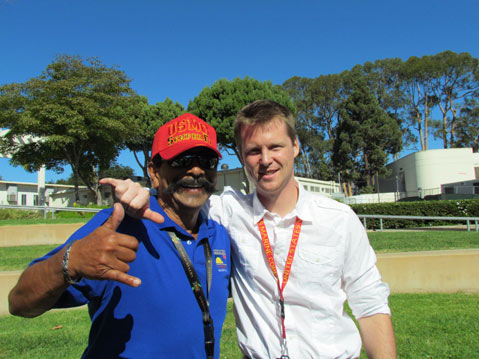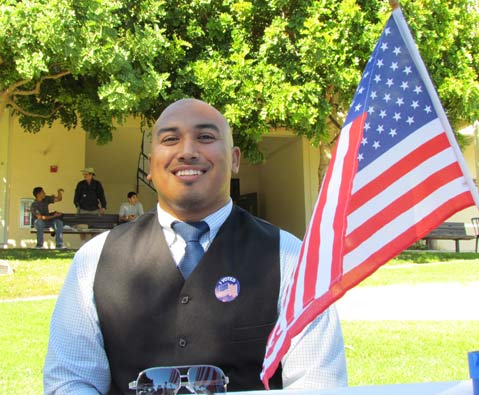Vets Hopeful About the Future
Giving and Receiving Services

Martin Caballero often has pain when he walks because of injuries he sustained in combat in Vietnam. Joseph Nagel suffers from traumatic brain injury (TBI) because of the multiple vehicle explosions he was in while in Iraq. Raymond Moura experienced transition issues when he returned from a 15-month deployment in Iraq, and still has dreams about his time there.
But rather than let adversities stop them from pursuing their ambitions, these and other local veterans are on the path to actualizing their goals and dreams for the present and the future.
Caballero, a 62-year-old veteran of the Marines, is about to graduate from Santa Barbara City College with a degree in Alcohol and Drug Counseling. He is a recovering addict, who “spent 35 years with a needle in one arm and a bottle in the other.” During those years he was in and out of various shelters and organizations, struggling to find hope for himself and for his future. Today, Caballero sports a handlebar mustache and sunglasses, as well as a smile, when he talks about his career goals, which are to help veterans returning from Iraq and Afghanistan who struggle with post-traumatic stress disorder (PTSD) as well as drugs and alcohol.

Caballero comes into contact with young veterans at the Veterans Administration Outpatient Clinic, and sees some of them struggling to hold on. “I want these kids that are coming home today to know that there is hope. I want them to know that they can come back and have a life here.” There were not many services available in the 1960s and early ‘70s, when vets like Caballero returned fromVietnam, and they suffered the consequences. The situation is different today. “Our reception coming home was great, and there were an amazing amount of services,” said Nagel, a 29-year-old Marine who completed three tours of duty in Iraq, in 2004, 2005, and 2006. “Vietnam veterans are also getting better services now, as well as the awards and recognition that they were due a long time ago.” Nagel struggles with PTSD, TBI, and OCD (obsessive-compulsive disorder), but because of his determination, he is working to turn these negatives into positives.
“The traumas that we go through can be turned into positive stepping stones; let them define you but never control you.” Nagel’s goals include purchasing a condo in Santa Barbara with his wife of five years, Carina Guimaraes. Together they hope to have children and enjoy the freedom to put down roots in the community.
There seems to be a pervasive sense of the importance of community service among Santa Barbara veterans. Moura, a 31-year-old graduate of UCSB, was deployed with the Army in 2003. He was stationed in Germany, then flew into Kuwait. His unit then marched into Iraq. As arduous as the long deployment was, he still feels a commitment to make improvements in his home country. “Just because my military service is over doesn’t mean that my service to my community is over,” he said. “After living and serving abroad, I can more easily see what can be done here at home.”
Moura, who works for Lois Capps, is board chair for The Future Leaders of America. The organization works with kids to improve education, develop leadership skills, and promote the importance of civic responsibility. Moura encourages veterans like himself to get active in their neighborhoods. “We as veterans are valuable to our country, and our communities will benefit from us getting involved.”
Although local veterans are finding success in their pursuits, many are still struggling to find their place in the community. Charlene (last name withheld), who served in the Air Force, suffers from chronic obstructive pulmonary disease. She is part of the marginalized population of homeless veterans, and became homeless when the house in which she rented a room was foreclosed upon, putting her on the streets in Los Angeles. “I slept in 28-degree weather with two coats, and a backpack for a pillow,” she recounted. “There are too many people on the street, and it breaks my heart.” Charlene is especially concerned with women who are homeless, and hopes to see an increase in services available for them.
In spite of her struggles, Charlene does plan to eventually return to her studies. She aspires to become a minister, an undertaking that she started years ago. “But God and I are going to have to discuss this one,” she added. More immediate goals include finding an apartment of her own, as well as helping other homeless women find safe places to live.
Fortunately, Charlene and other homeless veterans are able to take advantage of services in Santa Barbara such as the local Veterans Administration Outpatient Clinic, the Women’s Free Homeless Clinic, and Casa Esperanza. Casa Esperanza provides, among other things, public health clinic services, accessibility to a resource coach/case manager, and drug, alcohol, and mental-health treatment. To donate money to help homeless veterans, contact Imelda M. Loza, Esq., COO, Casa Esperanza at (805) 884-8481.



